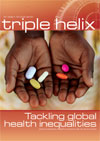- The nurse-doctor relationship is changing. But there is still too much conflict and lack of collaboration; and much potential for quality improvement.
- Nurses are not alone in suffering from negative relationships at work. Female doctors, especially juniors, are given less assistance and respect by female nurses.
- We need to be intentional about working in a patient and loving way with one another. Here lies another potential area of witness for Christian nurses.
In a recent issue of the Nursing Times, chief nurses were called to help tackle 'shameful' bullying statistics. (1) One in four NHS staff is bullied. This especially affects nurses. (2) Retention of nurses is further hampered by nurses reporting they feel frustrated and dissatisfied with working relationships that devalue their professional worth, especially that of the nurse-doctor relationship. (3)
The disciplines of nursing and medicine are expected to work in unusually close proximity to one another, not just practising side by side but interacting with one another to achieve a common good - the health and well-being of patients.
Collaboration, a relationship of interdependence, requires the recognition of complementary roles. Moreover, in a climate constantly demanding efficiency, cost-effectiveness, and quality improvement, nurse-physician collaboration holds promise for improving patient care and creating satisfying work roles. (4) Yet all too often, there is conflict and lack of collaboration between staff.
Historically, the doctor-nurse relationship has been characterised as an essentially a dominant- subservient relationship. (5) Some doctors, especially older ones, still view nursing through this hierarchical lens and sadly treat nurses in a dismissive, belittling or intimidating manner. Unhelpfully, the entertainment media is a leading source of this handmaiden imagery. (6)
Nursing is an autonomous profession and a distinct scientific discipline. It overlaps with medicine and one element of nursing is carrying out care plans crafted by medics. But nurses train, manage, and regulate themselves, with a unique focus and scope of practice, including special expertise. So when doctors show disrespect to nurses and don't listen to them, it is one of the major factors in nurses' dissatisfaction in their work.
Nurse-physician relationships have improved in certain healthcare situations, such as the operating room and intensive care settings. However, many nurses report that the same negative issues between nurses and physicians (7) that have existed for years still persist. A 2013 survey (8) found that the state of nurse-doctor relationships is still in need of improvement. In light of this, educators need to address how medical and nursing training can better equip doctors and nurses to work compatibly.
It isn't just nurses who suffer from negative relationships at work. Recent studies (9) show that female doctors, especially juniors, are given less assistance and respect by female nurses. Here lies another potential area of witness for Christian nurses - to model good interdisciplinary collaboration with female doctors, without prejudice.
For many years - until the 1960s - fewer than 10% of British doctors were female. Then things changed. For the past four decades about 60% of students selected for training in UK medical schools have been female. Now 43% doctors in UK are women. (10) By 2017, for the first time, there will be more female than male doctors in the United Kingdom. One positive effect of this is that it will further challenge the historical social trope which upholds the subordination of women in the caring environment and which has hindered the professionalisation of nursing.
In this climate, what an opportunity we have as Christian nurses and doctors (and indeed all healthcare professionals) to model good, respectful and loving teamwork.
Every given interaction may leave lasting positive or negative impressions on those involved, or on those who witness a particular nurse-physician interaction. We need to use the best knowledge and abilities of all health team members and, furthermore, to model kingdom values and cohesive team relationships.
We need to be intentional about working in a patient and loving way with one another, remembering Paul's instructions, to 'set an example...in speech, in conduct, in love, in faith and in purity.' (11)
It's important to outwork this in practice by avoiding gossip and speaking well of one another. Doctors could strive to be servant-hearted, especially in those less demarcated areas at work, like cleaning up after a medical examination, fetching case records or equipment, not presuming on nurses to do so. In God's wonderful, upsidedown kingdom, the first shall be last and the last first.
We lead by serving. Treat nurses as fellow professionals and respect their informed input on ward rounds and care planning. Please respect them when they say they can't perform a task - at times, even when they are competent, nurses may be constrained by legislation and restrictions on what they can and cannot do. This can be frustrating for them too.
Christian nurses primarily receive their self-worth from the Lord and know the value in what they do. This will enable them to nurse without approvalseeking or competitiveness with other nurses and doctors. They can especially aim to be more supportive and positive in the way they deal with (and talk about) doctors. I know first-hand the difference it made to medical students and junior doctors when I and other staff nurses actively sought to help, orient, advise and assist them as they came fresh to work on our ward.
One doctor recently told me how she had experienced particularly good support and Christian encouragement from nurse colleagues on a geriatric ward she'd worked on as an F2 (SHO) in London.
She writes:
SHOs looked after the ward day and night so we got to know our patients and the regular staff pretty well. It was a lonely job and quite tiring being on over the weekend, and especially sad at night on the darkened ward when a patient died. Going to certify an expected death behind drawn curtains with a couple of the nurses, the charge nurse and I stood very quietly and shared some prayers for the dead man. It felt right for us all. We were recognising and sharing our own sadness, giving support to each other, giving thanks for a life and putting him in God's hands. I was so grateful to the charge nurse for his initiative. Even on a ward where faith was recognised, it takes some confidence and courage to do this. I was grateful. (12)
Christian witness in the workplace is not just speaking the good news. We need reminding of Jesus' exhortations to us, 'Love each other. Just as I have loved you, you should love each other. Your love for one another will prove to the world that you are my disciples.' (13) And 'Since God so loved us, we also ought to love one another. No one has ever seen God; but if we love one another, God lives in us and his love is made complete in us.' (14)
My nursing colleagues used to be amazed at the love and trust that was immediately evident among Christians on the wards, whatever their professional title. They couldn't believe that sometimes we had only just met and hadn't known each other for years. This sort of relating, as loving brothers and sisters, is such a witness, and truly does reflect Father God in a powerful way.
So, as Christian doctors and nurses, let's try and model working in a climate of loving care, mutual respect and interdisciplinary collaboration, for his glory. I leave you with a challenge from a friend of mine: 'As Christians, can you relate to each other so qualitatively differently that it brings the world running?' (15)
Pippa Peppiatt is CMF Nurses Student Staffworker.
































